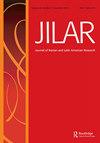Keiko的萧条与“Senderista陵墓”——论秘鲁的失落、脆弱与公共话语
IF 0.3
0 HUMANITIES, MULTIDISCIPLINARY
Journal of Iberian and Latin American Research
Pub Date : 2022-05-04
DOI:10.1080/13260219.2022.2097292
引用次数: 0
摘要
摘要藤森庆子在2016年11月的一次演讲中,坚决否认了有关她因在秘鲁总统选举中失利而患抑郁症的传言。藤森声称抑郁症是“失败者的”,这一说法在社交媒体上引发了一场风暴,人们质疑这位政治家在情感上不受损失影响的说法。当月早些时候,另一场截然不同的争议发生了最新的一幕。一个负责在科玛斯建造陵墓的组织的成员参加了纪念埋葬在陵墓中的人的仪式。科玛斯是一个在新闻媒体上被称为支持光辉道路的地方。本文以藤森的宣言和围绕科玛斯陵墓的讨论为切入点,思考秘鲁的损失、脆弱性和公共话语之间的关系。我认为,刀枪不入的表达为分析和批评根深蒂固的拒绝承认该国最近内部战争的后果提供了一个有用的场所。本文章由计算机程序翻译,如有差异,请以英文原文为准。
Keiko’s Depression and the “Senderista Mausoleum”: On Loss, Vulnerability, and Public Discourse in Peru
ABSTRACT In a November 2016 speech, Keiko Fujimori emphatically denied rumors that she was experiencing depression as a result of her defeat in Peru’s presidential elections. Fujimori’s claim that depression was “for losers” caused a storm on social media, with responses questioning the notion that the politician was emotionally unaffected by the loss. Earlier that month, the latest episode in another, quite different controversy had taken place. Members of an organization responsible for the construction of a mausoleum in Comas—a site branded as pro-Shining Path in the news media—participated in a ceremony honoring those interred at the tomb. This article uses Fujimori’s declaration and discussions surrounding the Comas mausoleum as entry points for considering the relationship between loss, vulnerability, and public discourse in Peru. I argue that expressions of invulnerability offer a useful site for analyzing and critiquing an entrenched refusal to acknowledge the consequences of the country's recent internal war.
求助全文
通过发布文献求助,成功后即可免费获取论文全文。
去求助
来源期刊

Journal of Iberian and Latin American Research
HUMANITIES, MULTIDISCIPLINARY-
CiteScore
0.60
自引率
0.00%
发文量
22
 求助内容:
求助内容: 应助结果提醒方式:
应助结果提醒方式:


